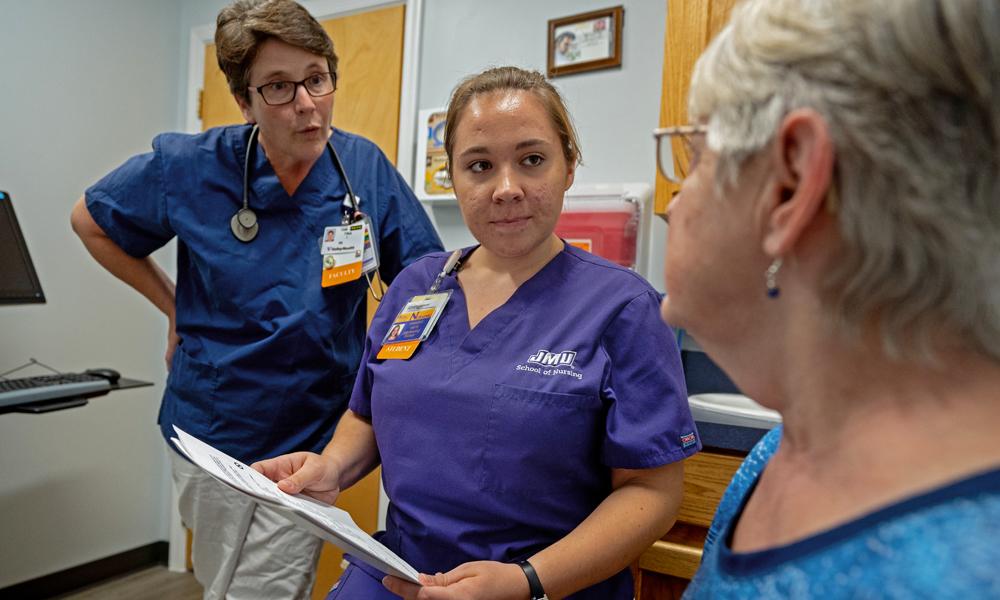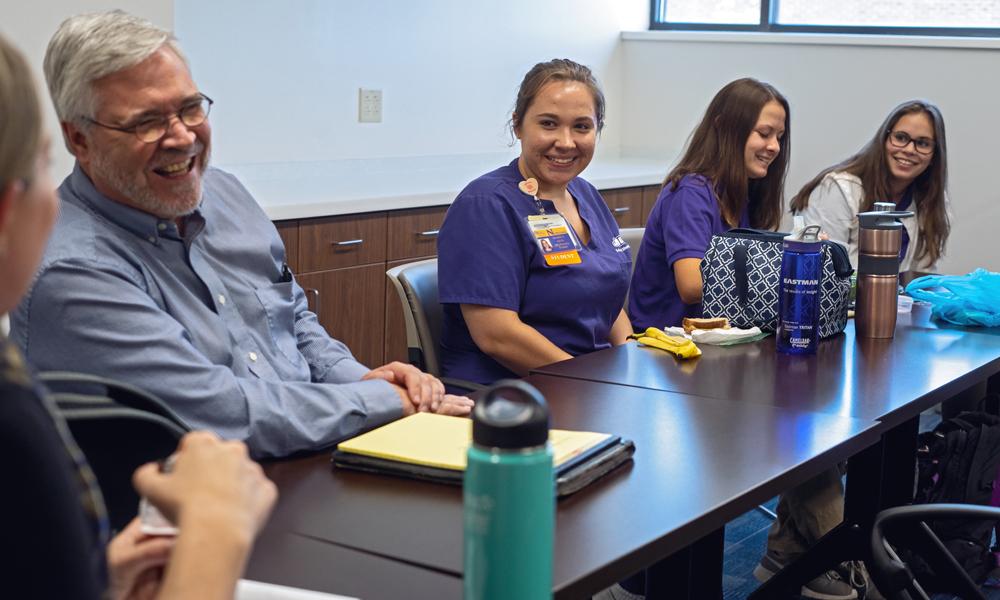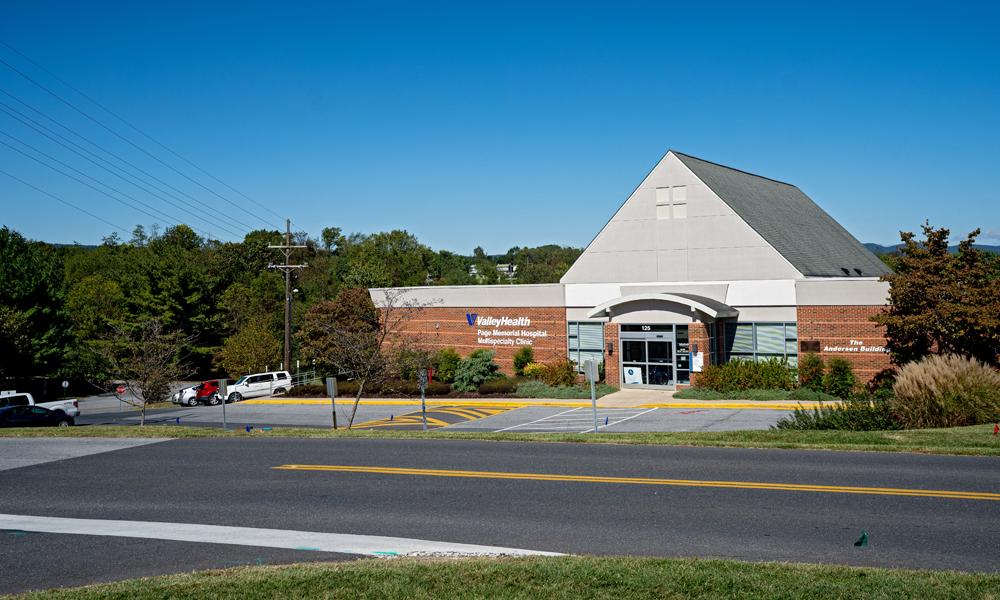Treating the community
New JMU Nursing partnership brings health care to rural patients
Health and Behavior
SUMMARY: JMU Nursing students are learning more about the nurse's role in coordinating care for patients while providing health care for a rural area.
By Victoria Martineau, Erika Metzler Sawin and Michele Dombrowski, JMU School of Nursing
The JMU School of Nursing secured $2.7 million in federal funds last year to recruit, admit and retain students interested in pursuing nursing and working in underserved primary-care environments. The first cohort of UPCARE Scholars began work in Spring 2019, and a second group started in the Fall 2019 semester.
The patients in neighboring Page County, Virginia, a federally designated medically underserved area in mental health, dental health and primary care, are benefiting from the developing expertise of students known as Undergraduate Primary Care and Rural Education Scholars. The scholars focus on the registered nurse’s role in coordinating care for patients’ substance use disorder, mental health and varying complex chronic disease needs in partnership with Valley Health Page Memorial Hospital.
Supported by a grant from the Health Resources and Services Administration’s Nurse Education, Practice, Quality and Retention program, the program aims to increase the number of BSN nurses working in primary-care settings. Each Bachelor of Science in Nursing student completes four semesters in clinical settings as part of the degree requirements. In Spring 2019, the first cohort of nine UPCARE Scholars began clinical rotations at the rural health clinics. Over the next four years, 56 students will participate in the program.

“Each population is different, just as each patient is different,” UPCARE Scholar Lauren Crebbs said. “An outcome of being an UPCARE Scholar is the opportunity it provides us to broaden our knowledge of the many different populations we may work with in our future careers.”
Working with BSN-prepared nurse preceptors, or specialized teachers, and health care professionals at the rural health clinics, UPCARE Scholars are learning about chronic disease management, preventive care, hospital transition management and health coaching. Along the way, the scholars are also learning about the “heart” of health care.
“From the time we spent there in one semester alone, I could tell that my peers brightened the day of each patient we cared for,” Crebbs said. “In any health care facility I’ve been to, I find that health care providers are often overwhelmed enough as it is with their roles that some patients don’t get as much lighthearted social interaction as they could. With our one-on-one assignment, we had the chance to provide constant care for our patients while also having the time to get to know them, hear their stories and help them create a plan to reclaim control of their health and maintain good health status.”
UPCARE Scholars are also learning about health care access and health disparities in rural areas from the front-line nurses affiliated with Valley Health Page Memorial Hospital Rural Health Clinics. The scholars benefit from a partnership with JMU’s Counseling and Psychological Services, and participate in interprofessional experiences as part of their mental health clinical.

The scholars work on both sides of the hospital doors, said Tina Switzer (’18M), UPCARE partnership liaison. “They have seen patients in the hospital, in their homes and in the clinics—sometimes the same patient in those different settings—to better understand the patient’s experience in a small, rural setting.”
In summer 2019, the UPCARE cohort members expanded their perspectives when they joined Virginia Commonwealth University nursing students for the second week of their own HRSA-funded program, Primary care Improved Outcomes with Nurses in Evolving and Expanding Roles (PIONEER). The students gathered for Primary Care Camp, a weeklong learning activity of exercises designed to teach students and health care professionals about primary care and rural health concepts and nursing interventions.
The unique urban and rural exchange joined students at JMU to collaborate on various topics related to rural primary care, such as quality improvement and financing health care and safety net programs. VCU students visited Page Memorial Hospital clinics, while JMU students visited two VCU hospital system clinics, CrossOver Healthcare Ministry and the Richmond Behavioral Health Authority. Students reunited on the final day at Piedmont Valley Community College for debriefing on their experiences and developed small-group case-study presentations to share with the larger group.
JMU UPCARE Scholar Jessica Discua-Aguilar was excited to participate in the Primary Care Camp, where she connected with PIONEER and VCU student Ikenna Onyeador.
“It was great getting to meet other nursing students from a different school and getting to know the similarities and differences between the UPCARE and PIONEER grants,” Discua-Aguilar said. “Getting to do clinical observations at Richmond was absolutely amazing. I shadowed medical assistants, nurses and doctors. The staff of each of the four locations made sure my peer and I were participating and learning.”
Onyeador added, “The entire week was a phenomenal teaching, learning and networking experience. We got to understand and see for ourselves the true essence of rural health care.”
Although the UPCARE Scholars program is in its early stages, faculty, students and community partners are working hard to grow the network so more opportunities like the Primary Care Camp can become possible.
“A lot of creativity and research, as well as trial and error, have started to bear some quality fruit, and I am excited to be a part of this team,” Switzer said.
While they are developing their nursing skills in clinical settings, some UPCARE Scholars are considering future roles.
“My mind has definitely been opened to the idea of working in primary care rather than a hospital,” Crebbs said.
“UPCARE is definitely an amazing support system,” Discua-Aguilar said. “I am so grateful to be a part of it.”

